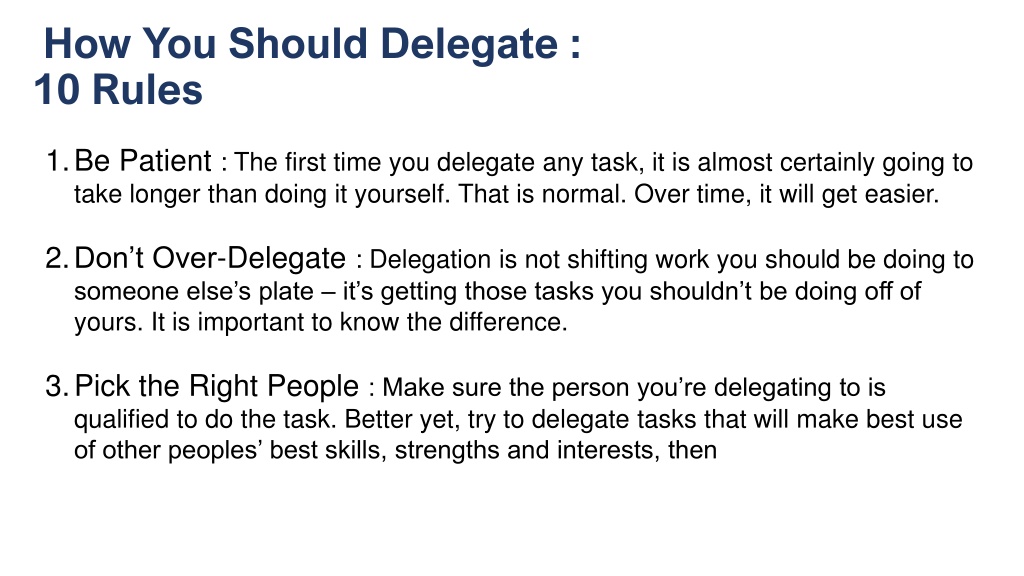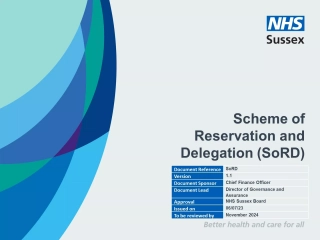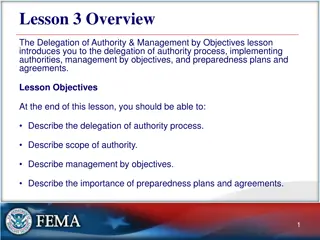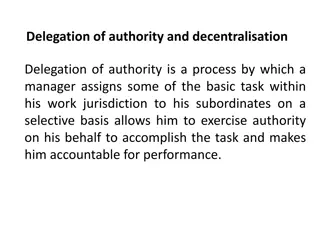Effective Delegation: 10 Rules to Master the Skill
Developing successful delegation skills is crucial for effective leadership. Follow these 10 rules to delegate tasks efficiently: Be patient, avoid over-delegating, choose the right people, explain the reason for delegation, provide specific instructions, offer training, check in regularly, avoid micromanaging, give feedback, and always express gratitude. Delegation is a two-way process that can benefit not only you but also those you delegate to.
Download Presentation

Please find below an Image/Link to download the presentation.
The content on the website is provided AS IS for your information and personal use only. It may not be sold, licensed, or shared on other websites without obtaining consent from the author.If you encounter any issues during the download, it is possible that the publisher has removed the file from their server.
You are allowed to download the files provided on this website for personal or commercial use, subject to the condition that they are used lawfully. All files are the property of their respective owners.
The content on the website is provided AS IS for your information and personal use only. It may not be sold, licensed, or shared on other websites without obtaining consent from the author.
E N D
Presentation Transcript
How You Should Delegate : 10 Rules 1.Be Patient : The first time you delegate any task, it is almost certainly going to take longer than doing it yourself. That is normal. Over time, it will get easier. 2.Don t Over-Delegate : Delegation is not shifting work you should be doing to someone else s plate it s getting those tasks you shouldn t be doing off of yours. It is important to know the difference. 3.Pick the Right People : Make sure the person you re delegating to is qualified to do the task. Better yet, try to delegate tasks that will make best use of other peoples best skills, strengths and interests, then
How You Should Delegate 4. Explain Why You are Delegating : When you select people to delegate to, tell them why you chose them, and how you hope to see this help them grow. Help them see each delegated task as an opportunity to row new skills. 5. Be Specific : Be specific with your asks, including why a task needs to be done, the deadlines, and the expected results. Vague instructions result in vaguely-terrible output ! 6. Provide Training : Delegation doesn t just mean handing off a task make sure people have what they need to do the job. A good rule of thumb is I do, we do, you do .
How You Should Delegate 7. Check In : Throughout the course of the project or task, always make time to touch base or check in. 8. But Don t Micromanage : Once you ve delegated, trained and agreed check ins, back away and let them get on with it. To succeed and help the person succeed, you need to let go. 9. Offer Feedback : Any time you delegate something, provide feedback on the end result (both positive and constructive). It is an extra step, but making sure you re getting exactly what you need, and helping others get better over time. This will help both in the long run.
How You Should Delegate 10. Say Thank-you : Never, ever, underestimate the power of simple polite words. The other person is saving you time and providing value. N.B. Delegation does not have to be a downward process. It can be sideways with a peer or colleague and even upwards to your boss if the relationship is right !























